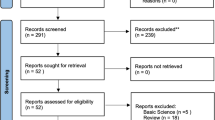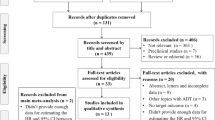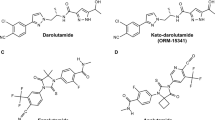Abstract
Background
Evidence for androgen deprivation therapy (ADT) and risk of dementia is both limited and mixed. We aimed to assess the association between ADT and risk of dementia among men with localized and locally advanced prostate cancer (PCa).
Methods
We conducted a retrospective cohort study using SEER-Medicare-linked data among 100,414 men aged ≥ 66 years and diagnosed with localized and locally advanced PCa (cT1–cT4) between 1992 and 2009. We excluded men with a history of stroke, dementia, or use of psychiatric services. Men were followed until death or administrative end of follow-up at 36 months. Inverse-probability weighted Fine-Gray models were used to estimate hazard ratios (HR) and 95% confidence intervals (CI) for Alzheimer’s, all-cause dementia, and use of psychiatric services by duration of pharmacologic ADT (0, 1–6, and ≥ 7 months).
Results
Among 100,414 men with PCa (median age 73 [IQR: 69–77] years; 84% white, 10% black), 38% (n = 37,911) received ADT within 6 months of diagnosis. Receipt of any pharmacologic ADT was associated with a 17% higher risk of all-cause dementia (HR 1.17, 95% CI 1.07–1.27), 23% higher risk of Alzheimer’s (HR 1.23, 95% CI 1.11–1.37), and 10% higher risk of psychiatric services use, though the confidence interval included the null (HR 1.10, 95% CI 1.00–1.22). Longer duration of ADT (≥7 months) was associated with a 25% higher risk of all-cause dementia, 34% higher risk of Alzheimer’s, and 9% higher risk of psychiatric services, compared with no ADT.
Conclusions
Our study supports an association between pharmacologic ADT and higher risk of all-cause dementia, Alzheimer’s, and use of psychiatric services among men with localized and locally advanced PCa.
This is a preview of subscription content, access via your institution
Access options
Subscribe to this journal
Receive 4 print issues and online access
$259.00 per year
only $64.75 per issue
Buy this article
- Purchase on Springer Link
- Instant access to full article PDF
Prices may be subject to local taxes which are calculated during checkout



Similar content being viewed by others
References
American Cancer Society. Facts & figures 2019. Atlanta, GA: American Cancer Society; 2019.
National Comprehensive Cancer Network (NCCN). NCCN Clinical Practice Guidelines in Oncology. Uterine Neoplasms Version 3 [Internet]. National Comprehensive Cancer Network. 2018. Available from: https://www.nccn.org/professionals/physician_gls/pdf/prostate.pdf
Grossmann M, Cheung AS, Zajac JD. Androgens and prostate cancer; pathogenesis and deprivation therapy. Best Pr Res Clin Endocrinol Metab [Internet]. 2013;27:603–16. Available from: https://doi.org/10.1016/j.beem.2013.05.001
Grossmann M, Zajac JD. Management of side effects of androgen deprivation therapy. Endocrinol Metab Clin North Am. 2011;40:655–71.
Sun M, Cole AP, Hanna N, Mucci LA, Berry DL, Basaria S, et al. Cognitive impairment in men with prostate cancer treated with androgen deprivation therapy: a systematic review and meta-analysis. J Urol. 2018;199:1417–25.
Nead KT, Gaskin G, Chester C, Swisher-McClure S, Dudley JT, Leeper NJ, et al. Androgen deprivation therapy and future Alzheimer’s disease risk. J Clin Oncol. 2016;34:566–71.
Nead KT, Sinha S, Nguyen PL. Androgen deprivation therapy for prostate cancer and dementia risk: a systematic review and meta-analysis. Prostate Cancer Prostatic Dis [Internet]. 2017;20:259–64. Available from: http://www.ncbi.nlm.nih.gov/pubmed/28349979
Jayadevappa R, Chhatre S, Malkowicz SB, Parikh RB, Guzzo T, Wein AJ. Association between androgen deprivation therapy use and diagnosis of dementia in men with prostate cancerandrogen deprivation therapy and dementia diagnosis in men with prostate cancerandrogen deprivation therapy and dementia diagnosis in men with prosta. JAMA Netw Open [Internet]. 2019;2:e196562–e196562. Available from: https://doi.org/10.1001/jamanetworkopen.2019.6562
Baik SH, Kury FSP, McDonald CJ. Risk of Alzheimer’s disease among senior medicare beneficiaries treated with androgen deprivation therapy for prostate cancer. J Clin Oncol. 2017;35:3401–9.
Deka R, Rose BS, Bryant AK, Sarkar RR, Nalawade V, Mckay R, et al. ADT and depression in veterans with prostate cancer treated with definitive radiation therapy. Int J Radiat Oncol Biol Phys [Internet]. 2018;102:e106–7. Available from: https://linkinghub.elsevier.com/retrieve/pii/S0360301618318509
National Cancer Institute. SEER*Stat Databases: November 2017 Submission: Incidence–SEER 18 Regs Research Data+Hurricane Katrina Impacted Louisiana Cases, Nov 2017 Sub (2000–2015) [Internet]. Available from: https://seer.cancer.gov/data-software/documentation/seerstat/nov2017/
Warren JL, Klabunde CN, Schrag D, Bach PB, Riley GF. Overview of the SEER-Medicare data: content, research applications, and generalizability to the United States elderly population. Med Care [Internet]. 2002;40(8 Suppl):IV-3–18. Available from: http://www.ncbi.nlm.nih.gov/pubmed/12187163
Ravi P, Karakiewicz PI, Roghmann F, Gandaglia G, Choueiri TK, Menon M, et al. Mental health outcomes in elderly men with prostate cancer1Equal contribution. Urol Oncol Semin Orig Investig [Internet]. 2014;32:1333–40. Available from: https://doi.org/10.1016/j.urolonc.2014.05.005
Fine JP, Gray RJ. A proportional hazards model for the subdistribution of a competing risk. J Am Stat Assoc [Internet]. 1999;94:496. Available from: http://www.jstor.org/stable/2670170
Deyo RA, Cherkin DC, Ciol MA. Adapting a clinical comorbidity index for use with ICD-9-CM administrative databases. J Clin Epidemiol [Internet]. 1992;45:613–9. Available from: http://www.jclinepi.com/article/0895-4356(92)90133-8/pdf
Austin PC. The use of propensity score methods with survival or time-to-event outcomes: reporting measures of effect similar to those used in randomized experiments. Stat Med [Internet]. 2014;33:1242–58. Available from: http://doi.wiley.com/10.1002/sim.5984
Matsos A, Loomes M, Zhou I, Macmillan E, Sabel I, Rotziokos E, et al. Chemotherapy-induced cognitive impairments: White matter pathologies. Cancer Treat Rev [Internet]. 2017;61:6–14. Available from: https://doi.org/10.1016/j.ctrv.2017.09.010
Papasozomenos SC, Shanavas A. Testosterone prevents the heat shock-induced overactivation of glycogen synthase kinase-3 beta but not of cyclin-dependent kinase 5 and c-Jun NH2-terminal kinase and concomitantly abolishes hyperphosphorylation of tau: implications for Alzheimer’s disease. Proc Natl Acad Sci USA [Internet]. 2002;99:1140–5. Available from: http://www.pubmedcentral.nih.gov/articlerender.fcgi?artid=122157&tool=pmcentrez&rendertype=abstract
Papasozomenos SC, Papasozomenos H. The activation of heat shock transcription factor 1 is differentially regulated in the brain of estrogen- and testosterone-treated heat-shocked rats. J Alzheimers Dis [Internet]. 2008;15:375–90. Available from: http://www.ncbi.nlm.nih.gov/pubmed/18997291
Kanemitsu H, Tomiyama T, Mori H. Human neprilysin is capable of degrading amyloid beta peptide not only in the monomeric form but also the pathological oligomeric form. Neurosci Lett [Internet]. 2003;350:113–6. Available from: http://www.ncbi.nlm.nih.gov/pubmed/12972166
McAllister C, Long J, Bowers A, Walker A, Cao P, Honda S-I, et al. Genetic targeting aromatase in male amyloid precursor protein transgenic mice down-regulates beta-secretase (BACE1) and prevents Alzheimer-like pathology and cognitive impairment. J Neurosci [Internet]. 2010;30:7326–34. Available from: https://doi.org/10.1523/JNEUROSCI.1180-10.2010
Ahlbom E, Prins GS, Ceccatelli S. Testosterone protects cerebellar granule cells from oxidative stress-induced cell death through a receptor mediated mechanism. Brain Res [Internet]. 2001;892:255–62. Available from: http://www.ncbi.nlm.nih.gov/pubmed/11172772
Hammond J, Le Q, Goodyer C, Gelfand M, Trifiro M, LeBlanc A. Testosterone-mediated neuroprotection through the androgen receptor in human primary neurons. J Neurochem [Internet]. 2001;77:1319–26. Available from: https://doi.org/10.1046/j.1471-4159.2001.00345.x
Chawla N, Yabroff KR, Mariotto A, McNeel TS, Schrag D, Warren JL. Limited validity of diagnosis codes in Medicare claims for identifying cancer metastases and inferring stage. Ann Epidemiol [Internet]. 2014;24:666–.e2. Available from: https://doi.org/10.1016/j.annepidem.2014.06.099
Zhu CW, Ornstein KA, Cosentino S, Gu Y, Andrews H, Stern Y. Misidentification of dementia in medicare claims and related costs. J Am Geriatr Soc [Internet]. 2019;67:269–76. Available from: https://doi.org/10.1111/jgs.15638
Leow JJ, Cole AP, Sun M, Trinh Q-D. Association of androgen deprivation therapy with alzheimer’s disease: unmeasured confounders. J Clin Oncol [Internet]. 2016;34:2801–3. Available from: http://www.ncbi.nlm.nih.gov/pubmed/27298418
Hernán MA, Sauer BC, Hernández-Díaz S, Platt R, Shrier I. Specifying a target trial prevents immortal time bias and other self-inflicted injuries in observational analyses. J Clin Epidemiol [Internet]. 2016;79:70–5. Available from: https://linkinghub.elsevier.com/retrieve/pii/S0895435616301366
Author information
Authors and Affiliations
Corresponding author
Ethics declarations
Conflict of interest
Toni K. Choueiri reports institutional and personal research support from AstraZeneca, Alexion, Bayer, Bristol Myers-Squibb/ER Squibb and sons LLC, Cerulean, Eisai, Foundation Medicine Inc., Exelixis, Ipsen, Tracon, Genentech, Roche, Roche Products Limited, F. Hoffmann-La Roche, GlaxoSmithKline, Lilly, Merck, Novartis, Peloton, Pfizer, Prometheus Labs, Corvus, Calithera, Analysis Group, Sanofi/Aventis, Takeda. Toni K. Choueiri reports honoraria from AstraZeneca, Alexion, Sanofi/Aventis, Bayer, Bristol Myers-Squibb/ER Squibb and sons LLC, Cerulean, Eisai, Foundation Medicine Inc., Exelixis, Genentech, Roche, Roche Products Limited, F. Hoffmann-La Roche, GlaxoSmithKline, Merck, Novartis, Peloton, Pfizer, EMD Serono, Prometheus Labs, Corvus, Ipsen, Up-to-Date, NCCN, Analysis Group, NCCN, Michael J. Hennessy (MJH) Associates, Inc (Healthcare Communications Company with several brands such as OnClive, PeerView and PER), L-path, Kidney Cancer Journal, Clinical Care Options, Platform Q, Navinata Healthcare, Harborside Press, American Society of Medical Oncology, NEJM, Lancet Oncology, Heron Therapeutics, Lilly. Toni K. Choueiri reports consulting or advisory role with AstraZeneca, Alexion, Sanofi/Aventis, Bayer, Bristol Myers-Squibb/ER Squibb and sons LLC, Cerulean, Eisai, Foundation Medicine Inc., Exelixis, Genentech, Heron Therapeutics, Roche, GlaxoSmithKline, Merck, Novartis, Peloton, Pfizer, EMD Serono, Prometheus Labs, Corvus, Lilly, Ipsen, Up-to-Date, NCCN, Analysis Group. Toni K. Choueiri reports no speaker’s bureau, no leadership or employment in for-profit companies. Other present or past leadership roles of Toni K. Choueiri: Director of GU Oncology Division at Dana-Farber and past President of medical Staff at Dana-Farber, member of NCCN Kidney panel and the GU Steering Committee, past chairman of the Kidney Cancer Association Medical and Scientific Steering Committee. Additionally, Toni K. Choueiri reports no patents, royalties or other intellectual properties. He reports travel, accommodations, expenses, in relation to consulting, advisory roles, or honoraria. His medical writing and editorial assistance support may have been funded by Communications companies funded by pharmaceutical companies. Furthermore, the institution (Dana-Farber Cancer Institute) may have received additional independent funding of drug companies or/and royalties potentially involved in research around the subject matter. Adam S. Kibel reports honoraria from profound, InSightec, Janssen, Merck, Pfizer, Blue Earth Diagnostics. Quoc-Dien Trinh is supported by the Brigham Research Institute Fund to Sustain Research Excellence, the Bruce A. Beal and Robert L. Beal Surgical Fellowship, the Genentech Bio-Oncology Career Development Award from the Conquer Cancer Foundation of the American Society of Clinical Oncology, a Health Services Research pilot test grant from the Defense Health Agency, the Clay Hamlin Young Investigator Award from the Prostate Cancer Foundation and an unrestricted educational grant from the Vattikuti Urology Institute. All remaining authors declare no conflicts of interest.
Additional information
Publisher’s note Springer Nature remains neutral with regard to jurisdictional claims in published maps and institutional affiliations.
Supplementary information
Rights and permissions
About this article
Cite this article
Krasnova, A., Epstein, M., Marchese, M. et al. Risk of dementia following androgen deprivation therapy for treatment of prostate cancer. Prostate Cancer Prostatic Dis 23, 410–418 (2020). https://doi.org/10.1038/s41391-019-0189-3
Received:
Revised:
Accepted:
Published:
Issue Date:
DOI: https://doi.org/10.1038/s41391-019-0189-3
This article is cited by
-
Androgen deprivation therapy for prostate cancer and neurocognitive disorders: a systematic review and meta-analysis
Prostate Cancer and Prostatic Diseases (2024)
-
Optimizing anti-androgen treatment use among men with pathologic lymph-node positive prostate cancer treated with radical prostatectomy: the importance of postoperative PSA kinetics
Prostate Cancer and Prostatic Diseases (2024)
-
Quantifying observational evidence for risk of dementia following androgen deprivation therapy for prostate cancer: an updated systematic review and meta-analysis
Prostate Cancer and Prostatic Diseases (2021)
-
Systemic Therapy of Common Tumours in Older Patients: Challenges and Opportunities. A Young International Society of Geriatric Oncology Review Paper
Current Oncology Reports (2020)



